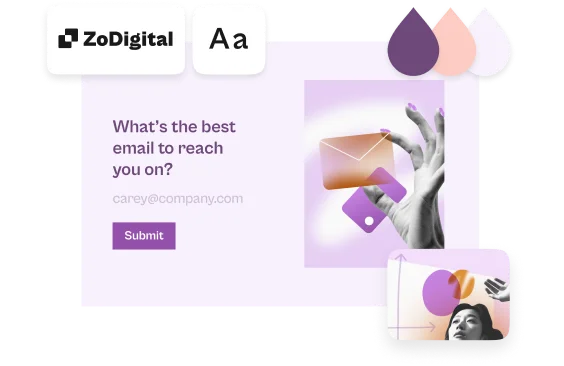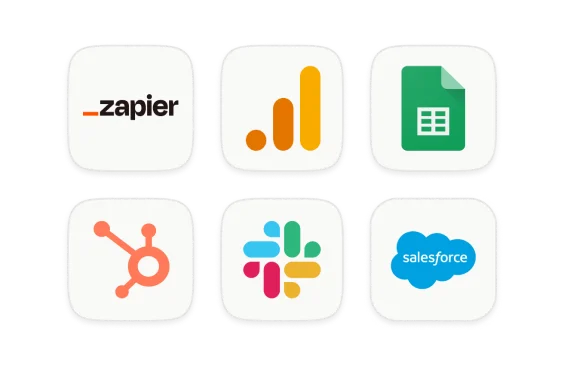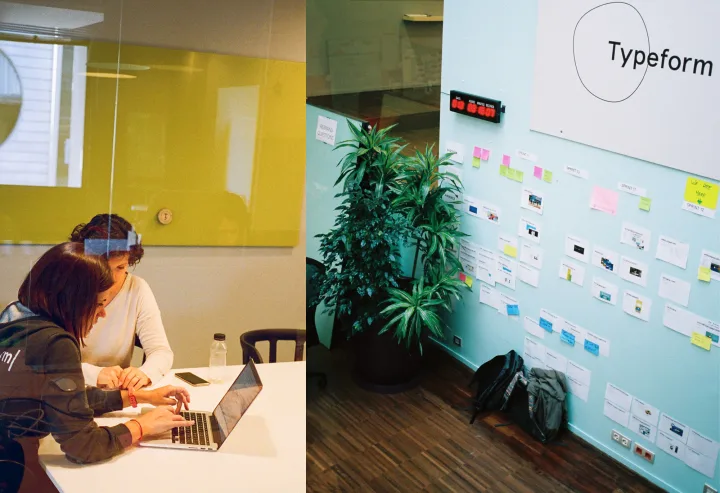Can you imagine Bill Gates using a Mac? How about Richard Branson flying United? And Mark Zuckerberg using Myspace? No, no, no.
Founders use their own products because they believe in them. At Typeform, we feel strongly about our product too.
We use typeforms for all kinds of interactions—from job applications, employee feedback, and creative content marketing, to organizing team events, validating product ideas, and handling customer requests.
Ready for your interactive tour? You can check out our typeforms, even add the templates right to your Typeform workspace.
Latest posts on Customers
So pour yourself a drink, sit back, and enjoy 21 ways that Typeform uses typeforms.
Typeforms for interacting with customers
“Our customers are everything. If they’re not happy, we all go hungry.”
Customers, clients, users, humans—whatever you call them—ours are scattered all over the world. So most of our interactions with these people take place online. Typeforms help us keep these interactions personal and fun, despite the digital distance.
1. Boosting brand awareness with quizzes
We’re always looking for fun, and inexpensive, ways to get the Typeform word out. So our marketing department uses typeforms to reach new audiences by tapping pop culture themes.
Example: over 11,000 people spent nearly 5 minutes on this Harry Potter quiz. Are you a true Potterhead? Go on, have a go:
2. Understanding our users: Persona survey
Who are you? And what do you want from us? To give you the features and services you want, we’ve got to know this. So we send out a user persona survey with a typeform.
Asking what customers want also helps us prioritize our time. Think webinars are cool? We think so too. But our survey told us that’s not the best place to invest right now.
3. Asking customers why they left: Churn survey
No matter how much love we pour into Typeform, occasionally we lose a customer. How do we move forward? Option 1: Grab a whiskey and sulk the day away. Option 2: Ask the customer why they left, so we can take steps to make it better (saving the whiskey for the end of the day). We do this with our typeform churn survey.
4. Learning how our customers use Typeform
Learning more about how users leverage Typeform not only provides product feedback, but also opens the doorway to customer success stories. We ask a few questions to help understand if the customer has a unique use case and how it impacts their business goals. Plus, it's a great way to get to know your customers better! Launch to build your own Customer Success Story Questionnaire Template
Typeforms for taking care of employees
“We wanted to build a company around great people. We figured revenue would come, but that comes after great products and treating people well.”
Made a bad hire? Good employee just left you? For HR, this is a nightmare. For company owners, this is wasted cash—an even bigger nightmare. As a quickly-growing startup, typeforms help us manage employee interactions—from job applications to perks.
5. Hiring with job application (type)forms
If you want to attract dull, corporate warriors, then write a dull, formal job description. At Typeform, we’re looking to attract unique, motivated, creative individuals. So we write our job applications to reflect our culture in an informal and friendly way.
And our typeforms are integrated with Workable via Zapier, making applicant tracking even easier.
6. Getting feedback with candidate experience surveys
We interview lots of enchanting people, and obviously we can’t hire them all. But we care about what people think. So everyone who goes through our interview process gets a candidate experience survey.
And we get useful feedback. Like when candidates tell us it’s hard to concentrate with all the noise around the office, or that our interview process is too long.
7. Onboarding new employees
We’re hiring people from all over the world. For lots of our new hires, Typeform HQ is one of the first places they go after landing in Barcelona. New places, new faces, and an office dog with that look in his multi-colored eyes that says, “Got any leftovers?”—it can be daunting.
To help out, we send our first onboarding typeform to new hires before Day 1. This way, newbies know what to look forward to when they step through the door.
8. Populating our company directory
With so many new faces around, it’s not always easy to keep track of everyone. To keep all the profiles in one place, people add themselves to our “Who’s Who?” Trello board with a typeform.
The typeform is integrated using Zapier, so name, photo, and other fun facts automatically appear in our directory. Now nobody gets stuck thinking, “What’s that programmer girl’s name again?”
9. Getting feedback from employee onboarding
Everyone starts at Typeform with a couple days, or a full month, of employee onboarding. And we want this experience to be relevant and helpful. So at the end, we send a quick feedback survey. This helps us know what we’re doing right, and where we need to improve.
What do they tell us? Onboarding is great, but we need to supply more big-picture vision from the get-go. And a day of team onboarding might help too. Good suggestions.
10. Choosing our catered lunch menu
Do you like leftovers? I don’t. That’s why it’s so nice to eat something you didn’t lug from home in a Tupperware. We have catered lunches every day to solve that. But not everyone likes the same things. Some people are full-time carnivores, some stick to veggies, and others like to mix it up. No problem. We just let the catering people know in advance with this typeform.
11. Ordering our personalized mug
After lunch, I need a coffee. Others prefer tea (yeah, we hire Brits too). Whatever the preference, we all pour it in our own personalized mug, which we customized through a typeform.
12. Selecting our wellness plan options
We used to have yoga classes and massages to keep us as agile as our platform development. But we filled up the office with new employees, so we didn’t have space for some of the old perks anymore. To take care of this, our Happiness Coordinator, Gabi, sent us a typeform to get feedback on new options.
Typeforms for communicating around the company
“Communication has to be easy so information can flow freely. We did away with the feeling of hierarchy. You can tap me on the shoulder any time.”
Typeform is growing quicker than a well-fed infant. And as we grow, it gets more important (and more difficult) to keep everyone in the loop. Typeforms help us keep workflows smooth (or at least a bit smoother) and get important info to the right place.
13. Keeping company meetings on track
We have a company meeting every other Friday. It’s a time to share info, eat chips, and drink beer. But we do this just after lunch, so we’re competing with “siesta” snoozing. We use a typeform—packed full of pictures, videos, and animated GIFs—to keep the presentations interesting and informative. And with a bit of luck, we keep people awake too.
14. Prioritizing topics for the meeting
Ever been in a meeting and talked about everything except the things you actually needed to talk about? So have we. And this kind of thing can’t happen when you meet with the board of directors. So when that day came, our customer success team put together a typeform to help prioritize the discussion.
15. Requesting IT service with Santa’s Letter
The Wi-Fi’s down again. Printer stopped working. My computer’s completely frozen. And what’s that password again?
These things happen in every office. And even more as teams get bigger. That’s why our IT crew also manages requests through a typeform. And thanks to a Zapier integration, responses are automatically turned into a Jira ticket, keeping the process as simple as possible. Pretty smart, right?
The team also added this GIF to the typeform, to make sure nobody submits a ticket before answering this fundamental question:
16. Requesting data from the growth team
Data-based decision making is no longer a smart-sounding luxury. It’s a basic tool. When we need numbers to help prioritize product updates or blog content, we just send a request to the data team with a typeform.
The typeform’s integrated with Trello via Zapier. So when I send a request, a Trello card automatically appears in the data team’s to-do list. No more “Did you get my message?”
17. Getting feedback on our Typeform LITE mobile MVP
A while back we built an app called Typeform LITE, a mobile typeform builder that lets you collect data on the go. As we were building out the beta version, we asked everyone around the company to send us feedback on the product through a typeform.
18. Validating ideas: What apps do you use?
Some ideas are at the MVP stage, others are still incubating. And then you have those ideas that are more like an uncomfortable itch—it seems like there’s something there, but maybe it’s nothing. We use typeforms to validate these itchy ideas too.
19. Voting on team-building events
Sometimes we have quick questions that need clear answers. Like when Pedro, our Director of Growth, sent a typeform to vote on February’s team-building activity.
There were some great options to pick from. We ended with a non-unanimous vote for the cooking class, but a completely unanimous agreement that we all had a good time.
20. Sharing results of a team-building survey
Our Customer Success team had different options to vote on for their team event. The votes came in, and the winner was… (to find out, you have to look for yourself).
21. Coordinating meet-up plans
Before Customer Success’ team-building event, a reminder typeform was sent out. It also helped coordinate transportation plans for everyone. So not only did everyone remember, everyone also had a ride.
And this brings us to the end of our tour. What did you think? Soon we’ll share some more personal ways that people in the office use typeforms to spread all kinds of interesting insights and information. Until then….






